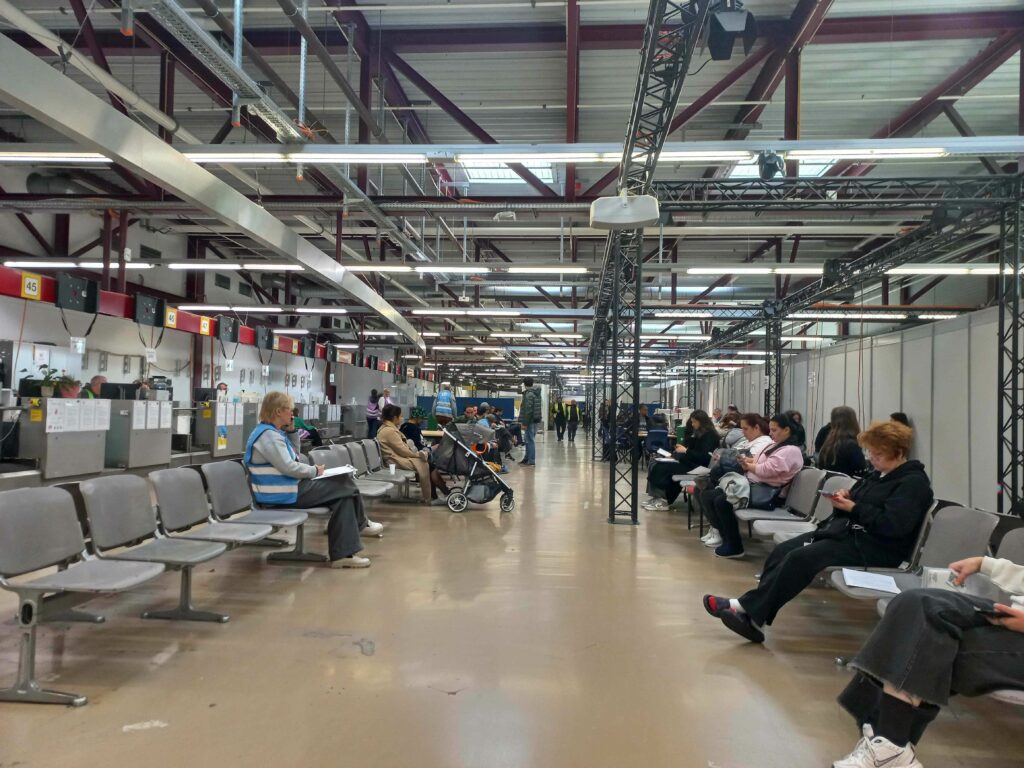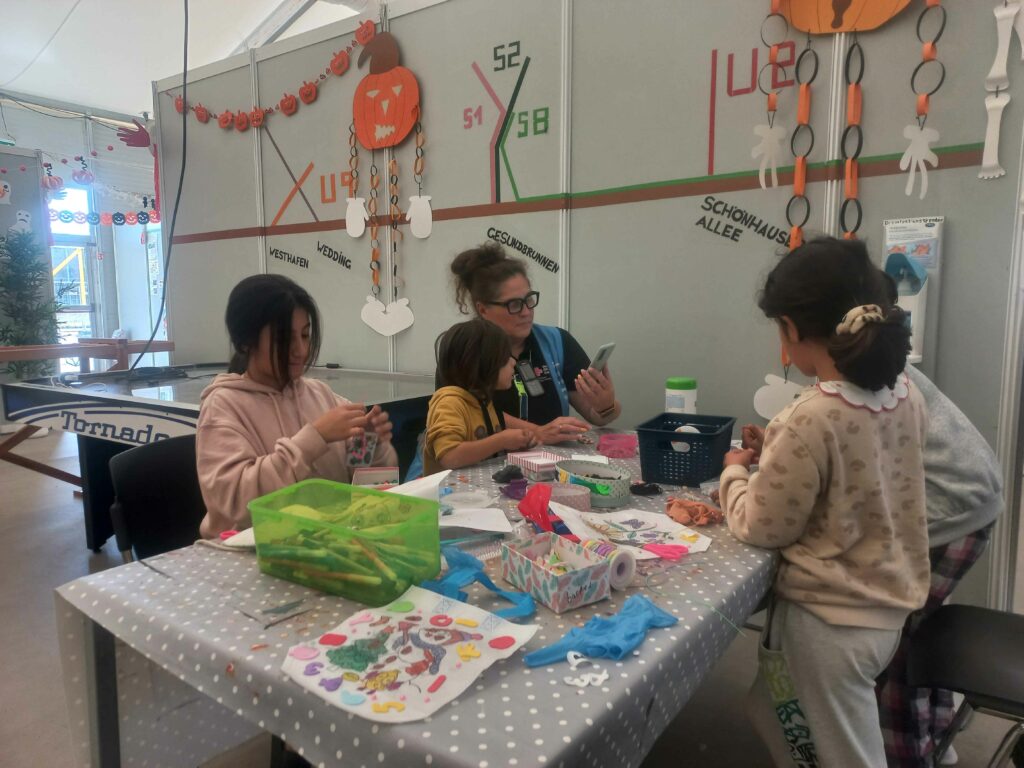by Sona Hovsepyan
As the war in Ukraine drags into its third year, the overcrowded Tegel camp continues to shelter Ukrainians.
In the north of Berlin, the now-shuttered Tegel Airport has transformed into a shelter for thousands of Ukrainian refugees fleeing the war since 2022, when Russian troops poured into Ukraine. Originally intended by the German government to be a short-term shelter for two to three nights before resettling refugees in other regions of the country, the camp has evolved into a new home for nearly 5,000 people stuck in limbo as the war in Ukraine stretches on. The massive influx of refugees has further complicated the situation, with over 1.1 million Ukrainians having already found asylum in Germany.
In front of the camp, where a sign reads “Terminal C,” bus 410 makes frequent stops. These shuttle buses are the sole option for refugees to leave Tegel, at least temporarily. New arrivals can be spotted by their bulky bags, while others board the bus to head downtown, hoping to start from scratch on tight budgets. With each bus arrival, security and aid workers closely monitor the refugees’ belongings as they enter the area. Sascha Langenbach, the spokesperson for Berlin’s State Office for Refugee Affairs, explains that such inspections are essential to ensure safety and prevent incidents.
“They might bring items that aren’t allowed here—camping gas, electrical devices, knives, etc. We had an incident earlier this year when one of the halls was destroyed [by fire]. Fortunately, no one was hurt, but we can’t allow that to happen again. That’s why we have these security measures. Security personnel are positioned in front of every tent, and we are now standardizing this procedure for everyone, no matter who they are or where they come from,” he says.
In early March, a fire broke out in the camp, covering an area of 1,000 square meters that housed 300 refugees. According to the Berlin Fire Service, the tent was entirely destroyed. While no one was injured, some refugees lost their belongings in the blaze. Langenbach notes that all efforts are being made to prevent similar incidents in the future.
The press spokesperson guides us through the refugee registration process before leading us to the canteen and cabin section. There, a middle-aged woman, Lilya Konylenko from Ukraine’s Dnipropetrovsk region, approaches him, asking for another cabin and complaining about the food provided.
“I don’t eat anything here; I’ve been living in the camp for a year and five months already,” she explains.
Lilya takes us to her room, which she shares with more than ten strangers. She describes the space as cramped and unclean. Nonetheless, this is the only personal space the camp can offer to each refugee.
“We do have cabins with fourteen beds, and, of course, we don’t have families with fourteen members,” Langenbach points out.
Konylenko arrived in Berlin alone, leaving her two sons and their families in Ukraine. She moved to the German capital to work and has recently managed to find a job at a restaurant. However, she can’t afford living outside the Tegel area.
“Compared to what is happening in Ukraine, I thank God I’m here,” the woman adds.
In the same room, next to Lilya Konylenko’s bed, a young man waves his hand and smiles gently.
“Sometimes I miss Ukraine, my family, and the food I am used to,” says the man, who prefers to remain anonymous due to safety concerns. A cook by profession, he expresses dissatisfaction with the “awful” food in Tegel, also pointing out the insufficient conditions for refugees. He fled alone from northern Ukraine and has been staying in Tegel for nearly six months.
“There are still mobilization issues. My parents suggest not to return until it’s over,” he continues.
To push back the Russian army, Ukrainian President Volodymyr Zelensky signed three draft laws in early April, lowering the minimum age for mobilization from 27 to 25, enabling younger men to be mobilized to ramp up the number of available troops in 2024. A total of 1 million Ukrainian citizens have been conscripted into the Armed Forces, according to National Security and Defense Council Secretary Oleksandr Lytvynenko. Ukraine is planning to conscript more soldiers into its military as Russia continues to gain ground in the east. “There are plans to call up more than 160,000 people,” Lytvynenko announced in late October.
Most of the nearly 5,000 refugees at Tegel are from Ukraine, although there also people from Syria, Afghanistan,Iraq, Georgia, Moldova, and other countries seeking refuge there. According to Berlin’s State Office for Refugee Affairs, nearly 250 Ukrainians arrived at the camp in mid-October, the majority coming from the eastern regions of Ukraine, where Russian forces continue heavy bombardments. Some of the new arrivals are amputees or persons undergoing chemotherapy, who need special care. Tegel has a small special care unit capable of accommodating up to 40 people.
“We planned to close facilities at the end of 2025. But it’s not clear whether we will be able to do that. It’s pretty tough to live here,” says Langenbach.
A section of the Tegel camp feels more vibrant compared to the rest of the facility. This area sees only a small number of refugees spending their time. Children gather around tables, painting colorful cartoon characters, with their completed artwork displayed on the walls. Meanwhile, in another part of the hall, young men are seated with notebooks and books, practicing German. Language proficiency is key for finding a job in Germany.
“We first went to Warsaw, Poland, but left after just a week before coming here, unfortunately,” laments Gleb, a skinny young man with striking yellow hair.
Leaving behind his mother and grandmother, he fled with his father from the central Ukrainian city of Cherkasy. During their time in Warsaw, they believed the conditions for refugees would be much better in Berlin. However, it turned out to be the opposite, as Gleb explained.
“We get 300 euros for two people per month. It would be the same in Poland, Italy, or any other country,” Gleb claims.
With a chance to continue his studies, Gleb is already looking ahead to greater goals. “I want to become a programmer and go to university,” he shares, his determination clear. Yet, returning to Ukraine isn’t an option for the young man. “I don’t want to go back to Ukraine; it is impoverished and corrupt,” he admits. Reflecting on the tough realities back home, he adds “My mother works at a school as an accountant, and she gets paid 200 euros a month.”
This article was published within the frames of “Correspondents in Conflict” Project,
implemented by Yerevan Press Club and Deutsche Gesellschaft e. V. The Project is
funded by the German Federal Foreign Office within the “Eastern Partnership Program”.
The contents of this article are the sole responsibility of the implementing partners and can in
no way be taken to reflect the views of the Federal Foreign Office. #civilsocietycooperation
 Sona Hovsepyan is a freelance journalist who has published long-form stories in Meduza, Novaya Gazeta Europe, Chai Khana, and other outlets, mainly focusing on human rights issues and Armenian foreign policy. She is currently in her fourth year at Armenian State Pedagogical University, majoring in journalism. Sona Hovsepyan has already gained professional experience at the Armenian local TV channel Factor TV and the Georgian Media Development Foundation. She is also a graduate of the Armenian investigative school Hetq Media Factory.
Sona Hovsepyan is a freelance journalist who has published long-form stories in Meduza, Novaya Gazeta Europe, Chai Khana, and other outlets, mainly focusing on human rights issues and Armenian foreign policy. She is currently in her fourth year at Armenian State Pedagogical University, majoring in journalism. Sona Hovsepyan has already gained professional experience at the Armenian local TV channel Factor TV and the Georgian Media Development Foundation. She is also a graduate of the Armenian investigative school Hetq Media Factory.














